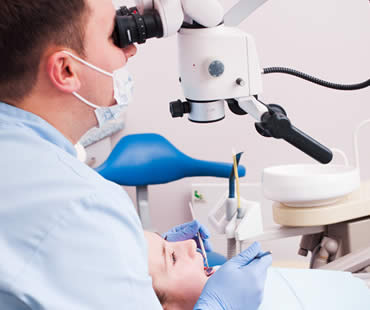
Your family, general, or pediatric dentist or orthodontist may refer you to an oral and maxillofacial surgeon for some dental treatments that require oral surgery. An oral surgeon is a specialist who has graduated from an accredited dental school and also completed additional education and residency related to surgical procedures needed to treat various oral diseases and conditions. An oral surgeon is trained in treating the following conditions:
- Removal of diseased or impacted teeth
- Placement of dental implants
- Treatment of facial trauma involving gums, jaws, nasal cavities, cheekbones, eye sockets, and forehead
- Evaluation of pathologic conditions such as cysts and tumors of the mouth and face or acute infections of the oral cavity, salivary glands, neck, and jaws
- Treatment of facial pain including those caused by temporomandibular (TMJ) problems
- Cosmetic or reconstructive surgery to correct jaw, facial bone, and facial soft tissue problems
- Corrective jaw surgery
- Cleft lip and cleft palate repair
- Surgical treatment for sleep apnea
There are many different techniques that oral surgeons use to accomplish your treatment goals. The choice of techniques may vary between surgeons and should be discussed between you and your surgeon prior to the procedure.
Many oral surgery procedures can be completed in an outpatient setting. Often you are only in the office for a few hours and can return to your regular routine in a matter of days. A good oral surgeon will be able to perform these procedures with little chance of complications, and will be able to provide you with the information you need to understand the recovery process. Your oral surgeon will often collaborate with other specialists, such as an orthodontist or cosmetic dentist, to achieve your ultimate treatment goals.
If you need a dentist in Longview contact us today

Life is full of special events that you will remember forever. When you look back at photographs from your special days, you will want to know that you looked your very best. Weddings, birthdays, reunions, graduations, anniversaries, job interviews, or that very special first date are times you will want to put your best face forward. Everything begins with your smile. Your dentist can help you prepare for these kinds of events by brightening your smile, making you look younger and more vibrant and boosting your self-confidence.
Your teeth naturally discolor with age, and this process is accelerated as you eat various foods and dark beverages. Blueberries, blackberries, and beets can all leave stains on your teeth. Dark sodas, coffee, tea, and red wine can also leave their mark with residual color on your teeth. Don’t find yourself feeling self-conscious about your discolored smile; talk to your dentist about what teeth whitening options are available to you. Not all whitening processes are good for every type of teeth. Your dentist will know what is ideal for you.
Before you whiten, it is important to have a dental exam and cleaning. The results of your whitening depend on the initial condition of your teeth. Cleaning your teeth ensures that the whitening procedure affects all of the areas of your teeth, and doesn’t leave out areas currently hidden by plaque or tartar.
Because some teeth whitening techniques require time to achieve the best results, you need to plan ahead. Begin with a consultation with your dentist several weeks prior to your special day, to allow time for the whitening process to work. Some people experience increased sensitivity to their teeth after whitening. Starting early will allow your teeth to recover from the whitening process.
A brighter smile will always help you look and feel better. It will help you make the most positive first impression. On your special day, when you smile for the camera, your confidence will show. You’ll love what you see in photos for years to come.
Our dental office is located in Longview

Your teeth and gums are physical assets that you want to keep healthy your whole life, and the best way to do that is to take care of them. Proper dental care needs to begin at a young age so that good habits are established for life. It is a parent’s role to teach children proper hygiene, and to ensure they get professional treatment. Here are some ways that you can help your child learn good dental habits.
Supervise brushing:
Parents should watch children brush their teeth, especially for ages seven and under, to ensure the appropriate amount of toothpaste is used and that none is swallowed. Have your child brush for about two minutes, and make sure all areas of the teeth and gums are cleaned. Provide tips and help as needed.
Establish good eating habits:
Teach your child that diet impacts oral health. Some foods worsen plaque buildup and introduce damaging acid into the mouth, leading to increased tooth decay and higher risk for cavities and gum disease. Certain foods and drinks are also known to stain teeth, or cause bad breath.
Promote water consumption:
Drinking water not only is good for your overall health, it’s also helpful to your mouth. Encourage your child to drink water after eating, especially if it’s not possible to brush teeth right away. Also, fluoridated water is proven to help fight cavities.
Visit the dentist:
Begin taking your child to the dentist around age one, so that the child gets good dental care and learns that dental visits aren’t scary. Have a positive attitude about checkups, and consider taking your child to a pediatric dentist who specializes in children’s oral health.
Be a role model:
As the saying goes, practice what you preach. Set a good example of brushing at least twice daily, flossing every day, limiting your intake of staining foods and drinks, and visiting your dentist regularly.
Our dental office is located in Longview

Do you have apprehensions regarding dental exams or therapies? Do you find yourself worrying about your teeth and concerned about exams? You are not alone. Many people experience anxiety or fear regarding the dentist’s office. You might want to consider sedation dentistry.
Qualified sedation dentists are able to work with you to get the dental care you require without the burden of fear or nervousness that might lead you to postpone work.
Sedation dentistry therapies are overseen and administered by specially trained dentists and dental technicians. These dental professionals have undergone hours and hours of special education in sedation equipment, techniques and medications. These trained individuals are aware of the best sedation options for each patient type, and they can administer them safely and reliably.
If you are thinking about sedation dentistry for your next dental treatment, consider the following:
- How much education does the dentist have related to sedation dentistry? What continuing education programs have been completed that specialize in anesthesia and conscious sedation?
- What organizations does the dentist belong to that provide ongoing education to keep the dentist and staff apprized as to the latest techniques and research? A good sedation dentist is always looking to learn new procedures that can benefit his or her patients, and can do so through professional organizations such as the American Dental Society of Anesthesiology.
- What equipment is in place to monitor a patient’s level of sedation? Sedation dentistry cannot be safely practiced without a pulse oximeter and oxygen equipment. Medications should be on-hand to reverse any rare reactions to the sedation.
It’s your right as a patient to have answers to these and all of your questions before you undergo any dental therapy. Your dentist should be very forthcoming. Having the right information allows you to make the right decisions for you and your dental care. Talk to your dentist today regarding these and any questions you have about sedation dentistry or his or her qualifications. Get the best care you need, and skip the worry!
Schedule your appointment at our Longview dental office

One of the most misunderstood procedures in dentistry is root canal treatment. If your dentist recommends this procedure, you might be quick to turn to the internet or other sources to learn about it. Unfortunately there is a lot of unreliable information out there, which can scare you away from needed treatment.
There are some common myths that circulate about root canal therapy. Instead of avoiding treatment, learn the truth about this procedure that may be the most effective way to save a damaged tooth.
Myth: Root canal treatment is very painful.
Truth: This procedure often serves to relieve pain instead of creating it. With the anesthetics and sedation dentistry available today, in most cases the procedure feels like simply getting a filling.
Myth: You don’t need root canal treatment unless you are experiencing severe tooth pain.
Fact: Pain is not always present when root canal therapy is advised by your dentist. A tooth that has died may no longer trigger pain, but treatment is necessary to eliminate infection and save the tooth. Diagnostic tests are available to help your dentist diagnose tooth problems even when pain is not present.
Myth: The benefits of root canal treatment are short-lived.
Fact: This treatment provides durable and long-lasting results, potentially for a lifetime. Since the tooth is usually topped with a crown, it can be protected indefinitely.
Myth: Root canal treatment causes illnesses.
Fact: This is one of the most common misconceptions you might run across on the internet. Based on very old research that has been proven to be wrong, the myth still exists that root canal therapy might cause various diseases. Instead, root canal treatment is safe and only improves your oral and overall health.
Myth: Tooth extraction is an adequate alternative to root canal therapy.
Fact: Dentists agree that saving your natural tooth is almost always preferred over a traumatic procedure like tooth extraction. The benefits of keeping your restored real tooth are better than having a hole in your smile or requiring tooth replacement solutions.
If you live in the Longview area contact us today

Proper dental care is vitally important for every member of your family. Children should begin visiting a dentist as soon as their first tooth erupts, which in most cases is by their first birthday. Your family dentist is trained to take care of both adult and pediatric dental needs. An experienced family dentist can offer a wide array of dental care services to the children in your family.
A family dentist can perform routine pediatric oral exams and twice yearly professional cleanings, as well as other preventative care such as treatment with fluoride and protective sealants. In the unfortunate case your child should suffer trauma to a tooth, your family dentist is available to treat a loose, broken, or knocked-out tooth. Your dentist can diagnose and treat gum disease, tooth decay and cavities as well as identify and treat misaligned or crooked teeth and jaw or bite problems.
Your family dental practice may also offer a variety of kid-friendly amenities to make visits to the dentist less stressful. Game rooms, televisions with kid videos, and treasure box treats are just a few of the things that might be available to help your child feel at ease.
As your child ages, there will be no need to switch dentists because your family dentist can treat your child from infancy to adulthood. Having the same dentist for your entire family makes life easier when it comes time to schedule routine examinations. Often you can schedule several family members at the same time. Your family dentist will be familiar with your entire family’s dental history, which is a major benefit of taking everyone to the same dentist.
When the time comes to choose a dentist for your children, you can feel confident your family dentist will provide a lifetime of excellent dental care.
Our dental office is located in Longview









